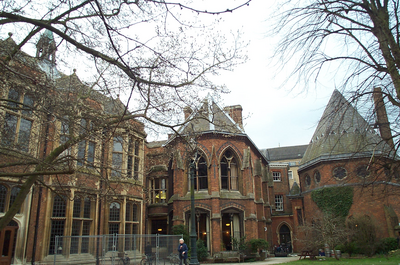On Thursday night, the Oxford Union voted in favour of the motion “This House Believes the UK is Failing Immigrants.” The final count had 224 members voting for the motion and 46 members voting against.
Speaking in favour of the motion were British-Punjabi immigration solicitor Harjap Bhangal and Peredur Owen Griffiths, a Plaid Cymru politician serving in the Senedd who has previously described the government’s immigration plans as “cruel and callous.” Union Librarian and third-year law student Ebrahim Osman Mowafy also spoke for the motion.
Richard Tice, leader of the political party Reform UK, spoke in opposition to the motion. His past comments on immigration have been the subject of much controversy – in November, he came under fire for stating on a BBC programme: “These huge mass immigration numbers are changing the nature of our country, it’s making us poorer financially and it’s making us poorer culturally.” Also opposing the motion were Union Graduate Officer Sarah Rana and New College student Prajwal Pandey.
Osman Mowafy opened the case for the proposition by detailing his own immigration journey from Egypt to England and stating “perhaps we are all immigrants.” He told the audience that the UK has a responsibility toward immigrants arising not only from common humanity, but also from British policies abroad. He cited the cases of Iraq and Afghanistan, where American and British military action displaced millions of refugees.
During Osman Mowafy’s introduction of the opposition speakers, he revealed private messages from Sarah Rana that referred to members of her own opposition side as “far-right nutters.” He also commented on what he perceived as the irony of Tice’s sitting on the bench beside two immigrants in light of his previous comments.
Graduate Officer Sarah Rana opened the case for opposition, declaring that the essential error of the proposition was its assumption that “The entire government is the UK people.” She drew a distinction between the policy of the UK government, which she considered a failure, and the treatment of immigrants by the UK public. Speaking of her own family’s experience immigrating to Manchester from Pakistan, she said that her family was welcomed by the people of the UK, who “helped them find their footing.”
She also emphasised the important role immigrants have played in the development of the UK, arguing it was the “blood, sweat, and tears of immigrants that has brought us here.”
Continuing the case for the proposition, Plaid Cymru politician Peredur Owen Griffiths reflected on the history of immigrants in Wales and their contribution to the development of Cardiff. He promoted his party’s attempts to “strive for inclusivity,” which he claimed are currently being stifled in Westminster.
Griffiths placed Welsh policy in contrast with the national government’s treatment of immigrants, which he classed as “hostile, brutal, and ineffective.” He accused the government of losing its humanity, citing the removal of cartoon decorated walls in children’s immigration centres and the abuse uncovered at Brook House by Panorama. Toward the end of his speech, he joked that James Cleverly was on a mission to prove not everyone lives up to their name.
PPE student Prajwal Pandey began his speech for the opposition by informing the audience that, having come to the UK when he was two years old, he was “grateful for the immigration system that has allowed [him] to do [so].” He drew a distinction similar to that drawn by the first opposition speaker, arguing that despite government scandals, the judicial system, the press, and the public are able to secure the rights of immigrants.
To conclude his speech, he cited poll numbers that showed the progress made in reducing discrimination against immigrants and discussed his grandfather’s imprisonment for his role in the Indian Independence Movement. The position he himself currently occupied as a student of Oxford, he argued, clearly demonstrated that progress had been made by the UK on the issue of immigration.
Closing the case for the proposition, Harjap Bhangal criticised government policy concerning international students studying in the UK. He argued that the government was not sufficiently welcoming of international students applying for visas after they obtained their degrees from English universities.
Highlighting the “euphoria of anti-immigration” present in media and politics, Bhangal concluded that Britain has been “sold a narrative and it hasn’t worked.” Bhangal told those scared of illegal immigrants – who arrive “with nothing but the clothes on their back and a mobile phone” – to “up their game” and remember that the levels of immigration in the UK pale in comparison to those in Colombia, Pakistan, and Iran.
Richard Tice closed the case for the opposition. He began his speech by declaring: “The whole premise of the proponents of this motion, they’ve completely and utterly missed the basic point. If a product is failing… you stop buying it.” He clarified that the “product” in question was entry into the UK – given the record 1.2 million people who legally immigrated to the UK in 2022, he argued, the UK was not failing its immigrants. “So clearly, far from failing, the product of the United Kingdom is actually appealing.”
This line, along with “the data speaks for itself,” was a common refrain throughout his address. In response to a point of information that accused Tice of ignoring the experiences of immigrants to make his arguments, he stated: “I’m not ignoring it, but the facts speak for themselves.” Similarly, he responded to a point of information that criticised the validity of his “product” analogy by declaring: “We are not failing, we are appealing.” His repetition of this stock phrase elicited a great deal of laughter from the audience throughout his speech.



